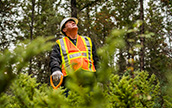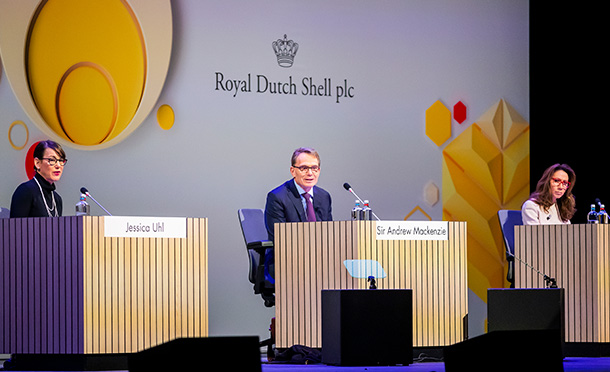Introduction from the Chair

I feel very honoured to have been appointed Chair at our 2021 AGM, particularly at such a pivotal time for Shell, the industry and wider society. It is also a great honour to succeed Chad Holliday, whose chairmanship I have much admired and who I know is warmly remembered not only for the Shell achievements he oversaw but also for his integrity and leadership.
Before being appointed Chair, I was delighted to participate as a Non-executive Director in the shaping of the compelling Powering Progress strategy that Shell unveiled in February 2021. I believe Shell has an exceptional portfolio of future-facing assets and, working with Ben van Beurden and the Board, we will profitably accelerate Shell’s transition to a net-zero emissions energy business that continues to generate substantial value for shareholders, customers and communities alike.
The recent simplification of Shell supports this value generation. The Board thanks our shareholders for the overwhelming support shown at the General Meeting in December 2021. This ultimately allowed us to establish a single line of shares to eliminate the complexity of Shell’s A/B share structure and to align Shell’s tax residence with its country of incorporation in the UK. On December 20, 2021, the Board formally approved the simplification, and on December 31, the Board approved the key steps required to move the Company’s tax residence to the UK. The Company’s name was changed on January 21, 2022, and the Company’s shares were assimilated into a single line of shares on January 29, 2022, completing the simplification.
Shell is proud of its Anglo-Dutch heritage and will continue to be a significant employer with a major presence in the Netherlands. The Group’s Projects & Technology division, its global Upstream and Integrated Gas businesses and its renewable energies hub remain in The Hague. Shell’s growing presence in offshore wind and the recent decision to build a world-scale low-carbon biofuels plant at the Energy and Chemicals Park Rotterdam underline the importance of the Netherlands to Shell’s energy transition activities. So too does the fact that we are working towards final investment decisions on plans to build Europe’s biggest electrolyser in Rotterdam and to participate in the Porthos carbon capture and storage project.
The last two years have been transformative – not just in the macroeconomic uncertainty around prices and demand for oil and gas products, but also in the ongoing impact on our ways of working, our people, our customers and their families. Throughout 2021, society continued to cope and live with COVID-19, with governments loosening and tightening restrictions based on local conditions. As vaccinations increased, workers in some regions started returning to offices. Various travel restrictions were lifted. But many of Shell’s office-based employees continued to work from home in 2021 and into 2022. Although our offices in some regions are returning to a new normal, many of our office-based staff have not worked together physically for almost two years. Health measures implemented at our sites have led to changes such as differing shift patterns and self-isolation. This can impact the time people are away from their families. Yet in this challenging environment, our people drove proposals to final investment decision across the business and safely delivered significant projects, such as the sale of our Permian assets, the divestment of the Deer Park refinery in Texas, USA, and Company simplification to name but a few.
As Chad said last year, the list of what our people do, and continue to do, for Shell and for each other is extensive and in many instances humbling. The Board and I thank them for their continued commitment, perseverance and personal sacrifices.
We are equally aware of the scale of the complex climate challenges confronting Shell and society. The answer, though, is not as simple as stopping the extraction of oil and gas and wholly shifting capital investment into other areas. The cash generated by Shell’s oil and gas operations provides returns to our investors, who can be global pension funds, governments, insurance companies and investment products through which the general public invest. Crucially, the cash flows from oil and gas also help fund Shell’s investments in lower-carbon energy businesses. These help Shell, our customers and entire sectors to cut emissions and accelerate the energy transition. The goal is a low-carbon world, not a single lower-carbon company. Achieving a low-carbon world requires governments, companies and society to work together to deliver change – to help people make the right choices, in a way that is affordable and inclusive. We believe that our Powering Progress strategy enables this. We think it allows Shell to successfully navigate the energy transition in step with society. We believe that the commitments Shell has made within its shareholder-approved energy transition strategy to drive this collective goal are market leading amongst the companies in our sector.
Energy transition strategy
In February 2021, Shell announced its intention to put its energy transition strategy to shareholders for an advisory vote every three years, with the first vote being at the 2021 AGM. This was an important step for Shell and the first time that an energy company asked shareholders to vote on its energy transition strategy.
Shareholders endorsed the energy transition strategy, with 88.74% voting in favour of this resolution. The Board thanks our shareholders for their support. At the 2022 AGM, scheduled for May 24, 2022, shareholders will be asked to vote on our progress in respect of our energy transition. Shareholder support is important as our business changes and we work towards our target to become a net-zero emissions energy business by 2050, in step with society.
Board leadership and Shell’s purpose
The UK Corporate Governance Code (the “Code”) provides that the Board should promote the long-term sustainable success of Shell, generating value for shareholders and contributing to wider society. The Board believes that Shell’s efforts give it an effective framework to play its part in the energy transition as a growing, successful, commercial organisation. In the Board’s view, this framework will allow Shell to provide the energy solutions that consumers will want and buy in this period of uncertain change. The Board also thinks that Shell will be able to deliver against its recently published targets and reduce the carbon intensity of the energy products it sells.
The purpose of Shell is set out in the early pages of this Annual Report. We will continue with the theme of communicating purpose throughout this Governance report. We will focus on how Shell’s governance operates in practice, and why we believe this is the best approach for us.
The Governance report is structured around the key themes of the Code. Our narrative seeks to explain how governance supports and protects Shell and our stakeholders.
Although Shell applies the principles and the spirit of the Code, there are instances where we adopt an approach slightly different from that suggested by some of the Code’s provisions. We explain these in section “Statement of compliance with the UK Corporate Governance Code”. In these instances, our governance processes are considered appropriate, given the specific circumstances and range of factors particular to Shell, such as its global nature, size, complexity and history. More detail on Shell’s compliance with the Code can be found in section “Statement of compliance with the UK Corporate Governance Code”.
Last year, Chad highlighted the importance of our stakeholders and the greater level of external focus on these groups. We also expressed our enthusiasm for building on our engagement with our stakeholder groups in 2021. The use of technology to facilitate virtual engagements proved valuable, and continues to improve. But sadly the continued restrictions on social interaction and travel, combined with other notable projects needing the Board’s attention, meant that we did not make as much progress on this ambition as we had hoped. As a result, this is a focus area for 2022, as outlined in the outcomes of the “Board evaluation”. Information on how the Board discharges its duty in relation to key stakeholder interests, including those of our workforce, and an explanation of how it considered these when making principal decisions are set out in section “Section 172(1) statement”. In section “Board activities and evaluation” we provide information about our Board activities and highlight which stakeholders we considered.
Our workforce engagement methods remain unchanged from those previously disclosed. As we continue to implement the proposals from our Reshape reorganisation, we anticipate an enhanced level of workforce engagement, within the parameters of COVID-19 restrictions. We continue to believe that constructive relationships built on mutual respect and transparency help Shell attract and retain employees while supporting greater productivity and operational safety and efficiency. Ensuring that the employee voice is heard on relevant matters in the boardroom in practical ways is key to understanding the broader impact of business decisions, including with respect to organisational culture.
The Board recognises the importance of culture and its link to delivering Shell’s purpose and strategy. Given our culture’s importance, it requires long-term commitment. The Board believes that our people and safety culture is strong, and takes pride in having such a culture.
Shell’s culture reflects the values of the organisation – honesty, integrity and respect for people. These underpin all the work we do and are embedded in our strategy and purpose. The Board continues to increase its focus on Shell’s culture and in 2021 the Nomination and Succession Committee initiated an in-depth examination of Diversity, Equity & Inclusion (see section “Nomination and Succession Committee”).
Division of responsibilities
More information on how the Board and its Committees support business operations is provided in section “Governance framework”. Further detail is contained within the Terms of Reference for each Committee, which are provided on our website. Each year the Board committees’ Terms of Reference are reviewed and updated, as required.
Maintaining independent judgement on the Board is a fundamental governance principle and one the Board supports. The Code provides circumstances that it considers are likely to impair, or could appear to impair, a Non-executive Director’s independence. One of these is tenure. In section “Statement of compliance with the UK Corporate Governance Code” we note that for part of 2021 our previous Chair, Chad Holliday, exceeded the recommended term outlined in the Code. When this new provision was introduced, we provided a clear explanation to shareholders that we believed it was right for the Company to exceed this term in order to ensure smooth Board succession. The Board also disclosed when it expected Chad’s tenure to end. Director and Chair succession has been facilitated in line with the timeline that was communicated to shareholders.
Composition, succession and evaluation
For biographies of current Board members see section “The Board of Shell plc”.
For how the Board, Committees and Directors appraised their performance see section “Board activities and evaluation”.
At the 2021 AGM, shareholders appointed Jane Holl Lute as a Non-executive Director to the Board. After joining the Board, Jane was appointed to the Audit Committee. An overview of Jane’s induction programme can be found in section “Nomination and Succession Committee”. Committee membership has been further reviewed during the year. The 2021 AGM was also Chad Holliday’s last day with Shell, after six years’ service as Chair and since joining the Board in September 2010. He left a distinguished legacy of strong, inclusive leadership, and the Board is deeply grateful for his tireless and dedicated commitment to Shell and its people over the years.
An overview of the Chair succession process was provided in the 2020 Annual Report and a summary is included in section “Nomination and Succession Committee”.
As announced on March 1, 2022, Jessica Uhl will step down as Chief Financial Officer of Shell plc, effective March 31, 2022. Sinead Gorman is to be appointed Chief Financial Officer of Shell plc, effective April 1, 2022. The Board is immensely grateful to Jessica for her tremendous contribution to the company over many years, but particularly as CFO and especially during the past two years as we successfully tackled the many challenges presented by the pandemic. She has been instrumental in strengthening Shell’s financial position, putting in place measures to secure the company’s long-term health while delivering industry leading cash flows year on year. Jessica has been an exemplary ambassador for Shell and the company’s strength today is testament to her professionalism, resolve and values-driven leadership.
Audit, risk management and internal control
The Audit Committee assists the Board in maintaining a sound system of risk management and internal control and oversight over Shell’s financial reporting. A variety of standing matters and more specific topics are discussed by the Audit Committee throughout the year. As part of the year-end reporting process, the Audit Committee advises the Board on the adequacy of the system of risk management and internal control, the appropriateness of the viability statement and going concern basis of accounting. The Audit Committee also advises on whether this Report, taken as a whole, is fair, balanced and understandable and provides the information necessary for stakeholders to assess Shell’s position and performance, business model and strategy. More information on the Audit Committee’s activities, highlights and priorities can be found in section “Audit Committee Report”.
Looking ahead
As we shared last year, Shell is at a point where it must transform itself. The steps of this transformation, will be intensely scrutinised by society and the environment in which we operate will continue to change rapidly. Not all of our stakeholders will be fully supportive of the decisions that we take, yet we must frame and implement our strategy with courage and commitment and a focus on the long-term success of the Company. This we will do with the humility to listen, learn and adapt. Shell’s Board and leadership must be steadfast, agile and sensitive to the opportunities, risks and rewards confronting the business. I, my fellow Directors on the Board, and our colleagues across the business, remain confident that Shell is up to the task.
Sir Andrew Mackenzie
Chair
March 9, 2022









